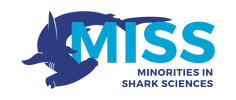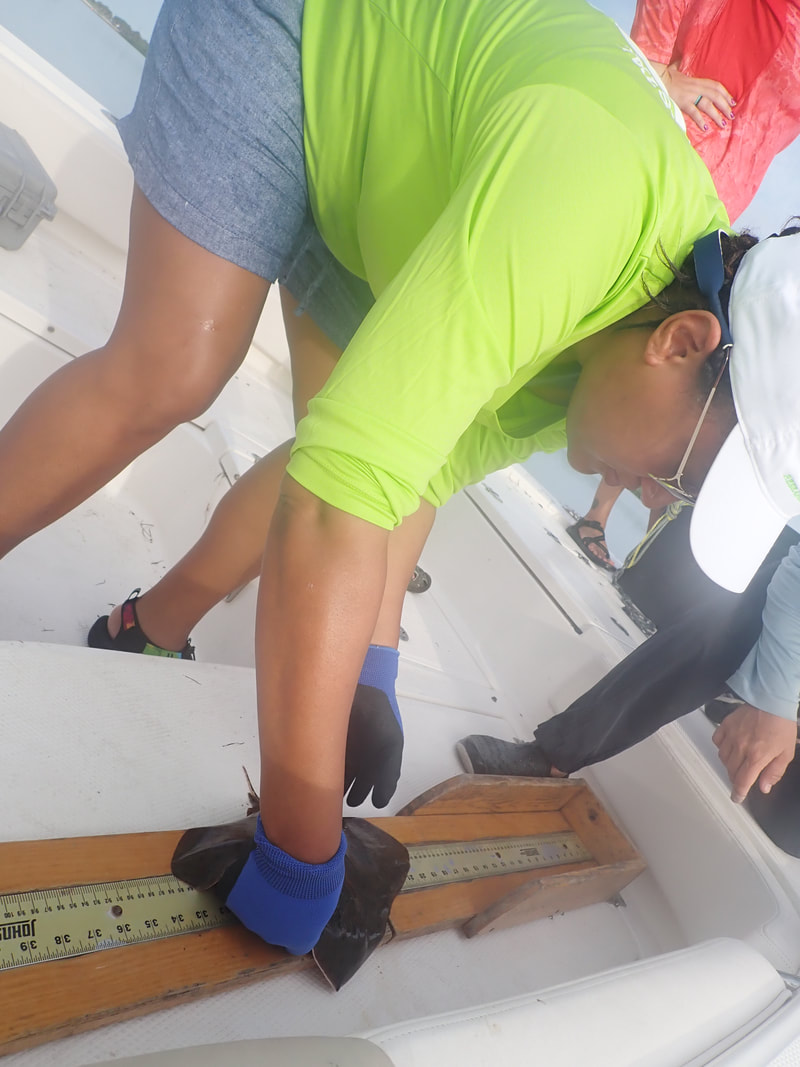|
The first thing I thought when I got the email that I had received a MISS fellowship to support my Shark research internship was “things like this do not happen to people like me”. Then there were tears of joy and thoughts of “how am I going to do this?” but the common refrain of “I can not believe I am getting this opportunity” repeated through my head all summer. I could not believe that someone saw my story - my history - and gave me this opportunity.
I am what is frequently now called a non-traditional student. In my case, this means euphemistically “mature”. I grew up in a time before social media. I was born to an African immigrant father and a white American mother and lived in a suburban town that did not match the diversity of the surrounding bay area. I did not see a space for a girl who looked like me in science – especially not shark science - so I chose another route. I grew up, went to college, got a degree in the liberal arts, moved away, and found my way to the healthcare field where I worked for 10 years before having my son. I watched as the world changed. I had fallen in love with the ocean as a young girl and through connections and education I learned more about what was happening to it because of human activity. I grew angry and concerned for the world I was leaving my son. In the meantime, visibility of women in science had increased. I could see myself becoming a voice for the planet. I started taking courses at ASU and then the world shut down. Being cooped up in my house, with my son, knowing I had just started my new direction was frustrating. However, this lockdown proved to be transformative for my directional path. In this time, I discovered MISS. MISS was created by four women who – when they did not see a space for themselves – created their own space. Then found each other and decided to create space for other women of color in their field. I discovered them via social media and when I learned of an opportunity to pursue shark field research – I sent in my application – still thinking “things like this do not happen to people like me”. Some weeks later I got my acceptance email and the offer of the MISS fellowship and found myself on a shark research boat in the Gulf of Mexico. Every day was different. On boat days, my co-fellow Aneysa and I would wake up, get ourselves some caffeine and “boat food” and get ourselves to New College where we would load up the gear for the day either onto our New College boat or into the New College truck. If we were working out of Sarasota Bay, it was straight onto the boat. When we worked out of Terra Ceia Bay and up into Manatee River, we drove our gear to the dock of the co-sponsor of our internship – Havenworth Coastal Conservation. We hauled fishing gear, bait and food coolers, equipment to take water chemistries as well as tools and instruments we would need in the field to measure and workup any elasmobranchs or teleosts that we caught. Some days we were successful – almost too much so on one day when we caught two separate schools of fish. One of cownose rays and one of crevalle jack which in addition to some various other species added up to over 100 total animals in one net. Other days were not. During the summer there was a bloom of Karenia brevis leading to a red tide event. The bay lost a lot of sea life during this time and seeing it firsthand was an educational event all on its own. I gained knowledge about fieldwork and marine science in general this summer. But I also gained so much more. I gained invaluable experience in a time when it seemed that would be impossible. And the most important thing I gained this summer was confidence. Not just in myself as a woman of color scientist going forward, but confidence in my place in the scientific community and knowing that I belong here and that I have the support of all the members and supporters of MISS.
1 Comment
|
Archives
May 2024
Categories |
About missMISS provides a community and funded opportunities for gender minorities of color who wish to enter the field of shark sciences. We aim to show that there are many gender minorities of color succeeding in and interested in this field.
We fundraise and apply for grants to create paid opportunities to attempt to knock down the financial barrier into shark sciences. We encourage other organizations in our field to do the same. |
Jump to:Our Story
Become a Member Friends of MISS Workshops Sponsorship Program Donate 2023 Annual Report 2023-2026 Strategic Plan Results Framework Final Report MISS is a registered US nonprofit, tax-exempt corporation under 501 (c)(3) of the Internal Revenue Code (EIN: 85-2192211).
|
CONTACT USMailing Address:
PO Box 10493 Bradenton, FL 34282 © COPYRIGHT 2022. Minorities in Shark Sciences Inc.
|


 RSS Feed
RSS Feed
